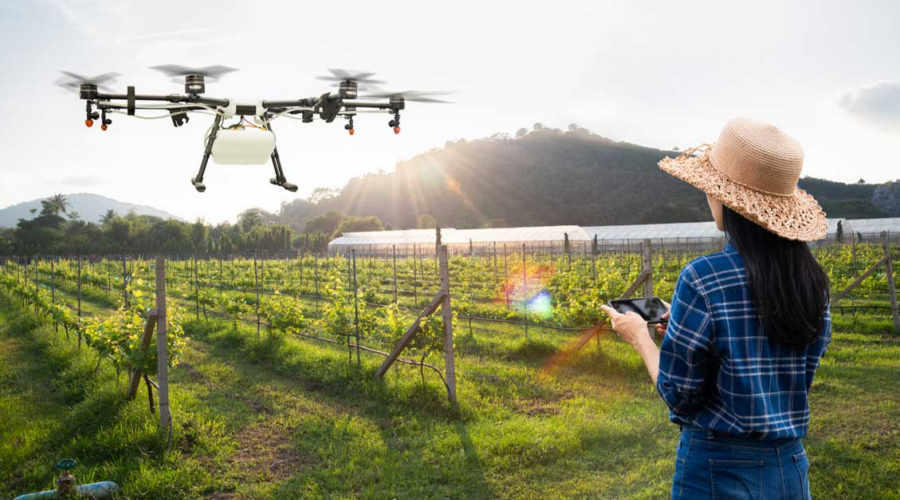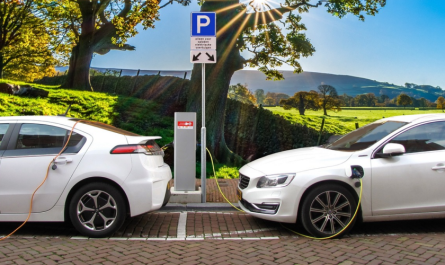Drones, also known as unmanned aerial vehicles (UAVs), are revolutionizing various industries by offering innovative solutions and efficiencies. From agriculture to entertainment, these flying devices are reshaping how businesses operate and interact with their environments. Let’s explore how drones are transforming these sectors and the potential they hold for the future.
Agriculture: Precision and Efficiency
Precision Agriculture
Drones are playing a pivotal role in precision agriculture, allowing farmers to optimize their operations.
- Crop Monitoring: Drones equipped with multispectral sensors can assess crop health, identify diseases, and detect pest infestations. This data enables farmers to make informed decisions about irrigation, fertilization, and pest control.
- Soil Analysis: By capturing high-resolution images, drones help in analyzing soil conditions, aiding in efficient land management and crop planning.
Efficient Resource Management
Drones enhance resource management by providing detailed insights into farm operations.
- Irrigation Management: UAVs can identify areas that require more or less water, helping conserve resources and improve crop yields.
- Livestock Monitoring: Farmers use drones to monitor livestock, reducing the need for manual inspections and ensuring animal welfare.
Construction: Enhanced Surveying and Safety
Surveying and Mapping
In construction, drones offer a fast and accurate way to survey land and create detailed maps.
- Topographic Mapping: Drones can quickly generate 3D maps and models of construction sites, improving planning and reducing costs.
- Progress Monitoring: Regular drone flights provide updates on construction progress, ensuring projects stay on schedule.
Safety and Inspection
Drones improve safety by performing tasks that would be dangerous for humans.
- Structural Inspections: UAVs can inspect hard-to-reach areas, such as rooftops and bridges, reducing the risk of accidents.
- Site Surveillance: Drones enhance security by monitoring construction sites and detecting unauthorized access.
Delivery and Logistics: Speed and Accessibility
Last-Mile Delivery
Drones are transforming the logistics industry by offering faster and more efficient delivery options.
- Quick Deliveries: Companies like Amazon and UPS are experimenting with drone deliveries to reduce delivery times and costs.
- Remote Access: Drones can reach remote or hard-to-access areas, ensuring essential goods are delivered to isolated communities.
Inventory Management
In warehouses, drones streamline inventory management and tracking.
- Automated Inventory Checks: Drones equipped with RFID scanners can perform inventory counts faster and more accurately than manual methods.
- Stock Monitoring: Real-time data from drones helps in maintaining optimal stock levels and reducing waste.
Entertainment: New Perspectives and Creativity
Filmmaking and Photography
Drones have opened new creative avenues in the entertainment industry, particularly in filmmaking and photography.
- Aerial Shots: Filmmakers use drones to capture stunning aerial shots that were previously difficult or expensive to achieve.
- Dynamic Filming: Drones offer dynamic movement and unique perspectives, enhancing storytelling and visual appeal.
Live Events and Performances
Drones add a new dimension to live events and performances.
- Drone Light Shows: Coordinated drone displays create mesmerizing light shows, adding a futuristic element to events.
- Event Coverage: Drones provide comprehensive coverage of live events, offering unique angles and enhancing viewer experience.
Environmental Conservation: Monitoring and Protection
Wildlife Monitoring
Drones assist in environmental conservation efforts by monitoring wildlife and natural habitats.
- Population Tracking: UAVs help track animal populations and migration patterns, aiding in conservation planning.
- Habitat Assessment: Drones capture data on habitat conditions, helping researchers assess environmental changes.
Anti-Poaching Efforts
In the fight against poaching, drones offer a valuable tool for surveillance and protection.
- Surveillance: Drones monitor protected areas, detecting poachers and illegal activities.
- Rapid Response: Real-time data from drones enables quick response to threats, enhancing wildlife protection.
Energy Sector: Inspection and Maintenance
Infrastructure Inspection
Drones are revolutionizing the energy sector by improving inspection and maintenance processes.
- Pipeline Monitoring: UAVs inspect pipelines for leaks and damage, reducing the need for manual inspections and increasing safety.
- Wind Turbine Inspections: Drones perform detailed inspections of wind turbines, ensuring efficient maintenance and reducing downtime.
Renewable Energy Development
Drones aid in the development and management of renewable energy projects.
- Site Surveys: UAVs conduct site surveys for solar and wind farms, optimizing placement and efficiency.
- Environmental Impact Studies: Drones gather data for environmental impact assessments, ensuring sustainable development.
The Future of Drones in Industry
The potential for drones to transform industries is vast, with ongoing advancements in technology and applications. As regulations evolve and technology improves, drones will continue to offer innovative solutions across various sectors.
Challenges and Considerations
Despite their benefits, drones present challenges that need addressing.
- Regulatory Issues: Navigating airspace regulations and ensuring compliance is crucial for widespread drone adoption.
- Privacy Concerns: Protecting privacy and data security is essential as drones become more prevalent.
Innovation and Growth
The future of drones is bright, with continuous innovation driving growth and new applications.
- AI Integration: Incorporating artificial intelligence will enhance drone capabilities, enabling autonomous operations and advanced data analysis.
- Expanded Applications: As technology evolves, drones will find new applications in fields like healthcare, disaster response, and urban planning.
Conclusion
Drones are transforming industries by offering new efficiencies, perspectives, and capabilities. From agriculture to entertainment, their impact is profound and far-reaching. As technology continues to advance, drones will play an increasingly vital role in shaping the future of various sectors.







